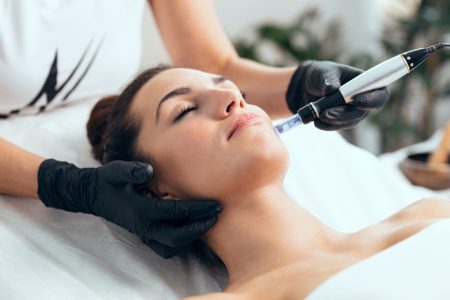Rejuvenation

Everybody will experience the ageing process- internal ageing affects everyone as we grow old. External ageing affects those who are chronically exposed to sunlight, causing photoageing or sun damage. This is more prominent in people with lighter skin types, those who live in sunny tropical weather or engage in outdoor activities, and certain outdoor professions.
Other factors such as smoking and poor nutrition may also accelerate the skin ageing process.
Common cosmetic problems of skin ageing include pigmentation issues (sun spots, age spots), rough dry skin, dull skin, deep wrinkles and saggy skin.
What are the methods of Skin Rejuvenation?
Our dermatologist will need to assess the skin and address the various cosmetic concerns of skin ageing, so that the skin rejuvenation treatment plan can be tailored and individualised to help restore the skin to a more youthful appearance.
Sun protection
Proper sun protection measures and the use of a good sunblock every day is still the most important first step. Avoid excessive and prolonged sun exposure during mid-day when its UV radiation is at its most damaging.
A healthy lifestyle with regular exercises, eating a healthy balanced diet, and stress management is also important for overall better skin health.
Dry skin and fine lines
Daily use of a good moisturiser is important to help improve dry and flaky skin. Retinoid creams can also be applied regularly to improve skin texture and fine lines, and to even out pigmentation.
There are also anti-ageing creams which may be effective. These may contain anti-ageing ingredients such as anti-oxidants, vitamin C, retinoids, alpha hydroxy acids, polypeptides, and various plant extracts.
Skin pigmentation
There is a wide range of prescription and non prescription pigmentation lightening cream formulations which use substances to help reduce pigment formation on the skin and to lighten existing pigmentation. These creams may contain prescription based hydroquinone, or a variety of other cosmeceutical lightening substances. For resistant melasma, there are oral tablets such as tranexamic acid which may be effective treatment for some people.
Pigment lasers can be used, such as the latest pico (picosecond) laser which can be very effective in treating different types of pigmentation issues, with minimal downtime and side effects. Several repeated sessions are often needed to achieve gradual lightening of the pigmentation, without causing side effect of post-laser darkening.
Complete rejuvenation of the entire face can also be achieved using combination lasers to lighten pigmentation, reduce pore size, improve skin texture and fine lines, for an overall brightening effect.
Irregular skin texture and scars
Various resurfacing procedures may be helpful to improve skin texture and treat facial scars, such as microdermabrasion, chemical peels and laser resurfacing.
Wrinkles and lines
Regular botulinum toxin (Botox) injections can help to reduce wrinkles and deeper lines on the face. Most commonly treated areas are the frown lines, crow’s feet at sides of eyes, and forehead wrinkles.
Dermal fillers (hyaluronic acid) may complement Botox treatment, by adding volume and gently smoothening out wrinkles and lines.
DISCLAIMER:
The information written and published on this website is not intended to substitute the recommendations of a trained professional and does not replace a professional consultation.
It is advisable to undergo a formal consultation to help establish a relationship between the doctor and yourself, accurately determine your concerns/problems, and get the appropriate treatments for them.
It is also imperative to note that the contents of the website with respect to treatments, results and pricing can vary from individual to individual, and can only be accurately determined by the doctor upon diagnosis.
Do note that all medical treatments will only be administered upon proper consultation, with the requirement that patients be above 21 years of age to provide legal consent.
Cosmetic Dermatology
Meet your Dermatologist

Dr Tay Liang Kiat
Dermatologist
Dr Tay Liang Kiat is a fully accredited Dermatologist who specialises in skin cancers, Mohs micrographic surgery, dermatologic and nail surgery, aesthetic dermatology and laser procedures. With more than 20 years of clinical experience, he also manages other aspects of general ambulatory and inpatient dermatology, including eczema, psoriasis, acne, urticaria, hair loss, children skin issues and other complex medical dermatology. In addition, he has expertise in the use of the latest immunotherapy (biologics) treatment for severe eczema, psoriasis and urticaria.



